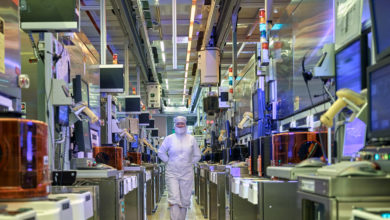Photo: Secretary of Defense Lloyd Austin at the AIPAC Leadership Forum. Credit: Wikimedia Commons.
We have entered a new Cold War, and with that a new era of McCarthyite witch hunts. Headlines in corporate media ominously warn the American public of “Chinese spies” among us, “pro-China influence campaigns infiltrating U.S. news sites,” and “pro-China social media campaigns to influence U.S. voters.”
The political weapon of choice in this latest era of McCarthyism is the Foreign Agents Registration Act, a once obscure and rarely enforced law, which is now being wielded with increasing regularity by the Department of Justice. FARA is a public disclosure statute, which requires any individual or entity that represents the interests of a foreign government to register with the Department of Justice. But the law is written in such a vague, sweeping manner and its applications are so broad that it lends itself easily to political weaponization, and can be used to indict those who oppose the new Cold War and innocent Chinese nationals as “Chinese spies” or “foreign agents.”
Specifically, FARA has been used to target Black liberation activists who have vocally opposed U.S. involvement in the Ukraine war and Chinese organizers advocating peaceful relations between China and the United States. Within the last few years, FARA has been used by the DOJ to indict and intimidate Chinese scientists, academics and researchers for as little as failing to disclose a foreign affiliation on a grant-related form.
Unsurprisingly, FARA is selectively enforced: Who does and doesn’t qualify as a “foreign agent” is entirely political, based solely on U.S. interests in this new Cold War climate. Think tanks, for example, are not required to register under FARA even though foreign governments contribute hundreds of thousands — sometimes millions — of dollars each year to encourage these institutes to produce policy reports and influence U.S. legislation to advance that country’s interests.
FARA should be repealed entirely. Its extreme vagueness is intentionally designed to have a chilling effect on free speech. It gives such wide latitude to prosecutors and bureaucrats to determine who is and is not a foreign agent that there is no way that it can be implemented in a way that does not impinge on the First Amendment. Examining the double standards in its enforcement underscores the need to get rid of the law once and for all.
While the recent targeting of activists and Chinese nationals under FARA have mostly been based on flimsy evidence, racial profiling and guilt-by-association tactics, below are four examples which reveal the hypocrisy of FARA’s enforcement. These four organizations are extraordinarily influential and have a major impact on U.S. foreign policy — and their links to the foreign governments they serve are well-documented and undeniable.
1-American Israel Public Affairs Committee
AIPAC is one of the largest and most powerful lobbying groups in Washington, D.C. In the 2022 election cycle alone, it spent nearly $3 million in lobbying, over $13 million in contributions to organizations and political candidates, and nearly $10 million on sitting Congress members. All this is to ensure the continuation of the $3 billion in aid that the U.S. government sends to Israel annually to maintain its apartheid regime against the Palestinians, that the U.S. government continues to act on behalf of Israel’s interests, and that politicians vote for policies that benefit Israel.
2-Center for New American Security
In 2016, the United Arab Emirates, seeking to develop its defense program, paid $250,000 to the Center for New American Security in exchange for publishing a study, which would essentially recommend the sale of U.S. military-grade drones to the Gulf state. At the time under the Obama administration, sales of attack drones were denied to the UAE because it was not considered a close ally.
Leaked emails obtained by The Intercept show communications between CNAS co-founder and CEO Michèle Flournoy — who then was also a senior Pentagon official under Obama — and UAE ambassador Yousef Al-Otaiba. The two discuss the authors’ views within the report. In these emails, Flournoy even sends Otaiba revised proposals of the study for his approval.
The study was published in June 2017. The report argued that the denial of military drones to certain countries harmed U.S. interests in that it had pushed them to turn to China to obtain these weapons. The paper ended with the recommendation that the U.S. government begin supplying drones to these countries, including the UAE.
In November 2020, the Trump administration announced the sale of $2.9 billion in armed MQ-9B aerial drones to the Gulf monarchy.
3-The Middle East Institute
The UAE is consistently the largest annual funder of the Middle East Institute, with the Gulf state donating a staggering $20 million to the think tank in 2016. The payment was routed through the Emirates Center for Strategic Studies, an Abu Dhabi-based think tank, but leaked emails show Otaiba arranging the payments to the institute. According to Otaiba’s email, the purpose of the massive donation was to encourage MEI to “augment its scholar roster with world class experts in order to counter the more egregious misperceptions about the region [i.e., those advanced by Qatar and Iran], inform U.S. government policy makers, and convene regional leaders for discreet dialogue on pressing issues.” That same year, the Saudi and UAE governments both directly contributed at least $1 million, and according to MEI’s annual contribution reports, the latter has consistently been the top donor to the policy institute since.
And the investment has paid off. MEI and its representatives continually churn out op-eds, articles and policy reports lobbying on behalf of the UAE government and its regional ally Saudi Arabia, encouraging the U.S. government to “recommit” to the region and parroting Otaiba’s own anti-Iran, anti-Houthi stances.
4-The Atlantic Council
The UAE is also a top funder of the Atlantic Council, donating at least a million dollars in 2019.
Since this donation, the think tank has partnered with the Abu Dhabi National Oil Company and the UAE Ministry of Energy and Infrastructure to host its annual Global Energy Forum. In January, Frederick Kempe, CEO and president of the Atlantic Council even published a CNBC op-ed in support of the UAE decision to appoint Sultan Al-Jaber, the CEO of the ADNOC — the 14th largest oil producer in the world — as president of the COP 28 UN climate conference. Both ADNOC and Masdar, the renewable energy investing firm of which Al Jaber was founding CEO, are major sponsors of the Global Energy Forum. Once this close financial relationship was revealed between the think tank and Al Jaber’s companies, CNBC was forced to amend the op-ed with a disclosure within the article, as well as an editor’s note at the beginning warning readers that “the financial relationship between the companies and Atlantic Council as well as the obvious conflict of interest were not disclosed to CNBC prior to publication of this column and do not meet our standards of transparency.”
Leaked emails have also shown communications between Otaiba and then-director of the Atlantic Council’s Middle East and Security Initiative Bilal Saab, in which the former was allowed to review and make edits to policy reports. Among the reports Otaiba was allowed to review was an analysis paper on “Iran’s regional challenge,” the foreword of which was written by Saab and attributed to former U.S. army general and CIA director David Petraus.
Saab left the Atlantic Council in July 2017 for MEI, where he continues to maintain a close relationship with Otaiba.




